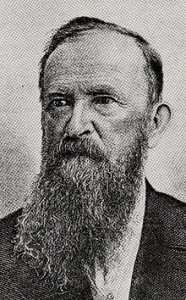War-time excitement does not prevent many white Baptists of the South from engaging in ongoing religious debates whose origins predate the war. One ongoing Baptist debate is over the issue of Landmarkism, a formal movement with origins in the early 1850s and expressing the belief that Baptist are the only true Christians, or said another way, that the true Church is comprised only of Baptist congregations. Accordingly, Landmarkists teach that the only true acts and ordinances of Christianity take place within Baptist congregations.
The Landmark movement has already made significant inroads among Primitive Baptists, who tend to share with Landmarkers a belief in the exclusiveness of the Baptist faith and opposition to Christian organizations other than local congregations as well as churchly acts not expressly taught in the Bible. In addition, the movement has impacted Southern Baptist life, particularly in Tennessee, Arkansas, Texas and the southwestern frontier at large.
Chief among proponents of Landmarkism is James R. (or J. R.) Graves, one of the most prominent Baptists in Tennessee, in no small part due to his position as the editor of the state Baptist paper, the Tennessee Baptist. Today, Graves’ newspaper publishes a letter to the editor in defense of Graves and the Confederacy. The letter-writer is a Texan.
Bro. Graves:–Inclosed [sic] you will find part of what I owe you for your invaluable paper. I do not remember the amount that I owe you. When you send my receipt, please state the residue. Times are very hard here, but as long as I can raise any money I intend to take the Tennessee Baptist, which I consider, not only one of the leading Baptist, but one of the leading religious papers in the world. I have been a subscriber to the Tennessee Baptist for the last 15 years, and hope to be for the remainder of my earthly pilgrimage. I entirely approve of the noble stand which you have taken with regard to the cardinal and vital principles of “Our Church.” Your course is approved by the Baptist Churches throughout this portion. And should you ever make a tour through Eastern Texas you will be unanimously welcomed as one of the most able and zealous defenders of Baptist principles. We all sympathize with you in your persecutions for the truth’s sake, and hope and pray for you to successfully withstand the attacks of your enemies. Your noble stand for the South should endear you to every true Southern man. We are all united in Texas, and are determined to resist as long as one man is left to offer resistance. I am proud that my native State, “Old Tennessee,” has taken so noble a stand in defense of Southern rights. I am sorry though that she contains any traitors, any sympathizers of the Lincoln despotism. Abolitionism has been a pest and a nuisance to our country for many years; we will now be free from its baneful influence as well as all the hateful isms of the prolific North—prolific in the fooleries, absurdities, and fanaticism of the day—in religion, morals, and politics.
Corn crops are generally good throughout our State. All the cereal crops are generally good. Cotton, though, is not first rate. More than enough has been produced to do us, consequently Lincoln’s blockade will not injure us.
Health is not good. The chills and fever have been quite common.
You will please pardon my writing on the leaf of a blank book. I have no paper, and I know of none within 40 or 50 miles of me.
I remain your brother in Christ,
John Vaught.
Source: Tennessee Baptist, November 23, 1861 (link); photo (link)



